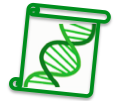Genetic Tests: Halo or Horns? Is FDA a Watchdog, Meddler or a Dawdler?
August 6 2010
I'm all for entrepreneurism (being one myself). And capitalism. And free speech. And freedom, the right-to-know...
…and the philosophy of "first do no harm."
Sometimes these noble ideals are in conflict. For instance, the right to make money ends when spammers and spoofers get in the act (at least in MY humble opinion).
Personalized medicine, and the philosophy behind genetic testing, is also a noble ideal; it has already demonstrated considerable value. But minimizing the risks due to jumping to erroneous conclusions is going to take a lot more data, complemented with a lot more analysis and sophisticated interpretation of that data.
Technology Review's Emily Singer wrote two articles in July, covering direct-to-consumer "Genetic Tests Get Bad Grades" and physician-ordered tests "A Turning Point for Genetic Testing" respectively.
Direct-to-consumer diagnostic tests can have value -- IF they're used as a guide to take proper action. False negatives are certainly problematic, however. For instance, Dollar Tree stores here sell pregnancy tests for $1!
Ms. Singer writes how a series of "secret shopper" calls to 15 consumer genetic testing companies generated "shocking findings," which you can read for yourself at the first link. Worse, the top four companies in the field report conflicting results for a person's risk for developing prostate cancer, from less-than-average to above-average risk.
My question: Why doesn't the FDA act…NOW, as they did with Pathway Genomics (see the second link, above)? This is not an issue of "Big Brother" protecting us from real or even imaginary threats, but rather, I think, it is an issue similar to Truth in Menu laws that govern nutritional claims on restaurant menus.
Coming back to Ms. Singer's second article.
WebMD and other consumer sites have sprung up because many (most?) physicians simply don't have the time to thoroughly research every medical condition their patients may encounter. Now consider the complexities of genetic screening. Can the harried doctor truly be expected to do much more than take a lab's word that someone is at a greater or lesser risk for a particular disease?
One of the best articles I've seen on this topic was written a year and half ago, but it's still mighty relevant.
Perhaps the caveat should be: "Trust not a single source" (of information).
Actually, I wrote that back in May 1998.
Category: Open to Debate
Filed under: Government/Legislation, Cancer
I'm all for entrepreneurism (being one myself). And capitalism. And free speech. And freedom, the right-to-know...
…and the philosophy of "first do no harm."
Sometimes these noble ideals are in conflict. For instance, the right to make money ends when spammers and spoofers get in the act (at least in MY humble opinion).
Personalized medicine, and the philosophy behind genetic testing, is also a noble ideal; it has already demonstrated considerable value. But minimizing the risks due to jumping to erroneous conclusions is going to take a lot more data, complemented with a lot more analysis and sophisticated interpretation of that data.
Technology Review's Emily Singer wrote two articles in July, covering direct-to-consumer "Genetic Tests Get Bad Grades" and physician-ordered tests "A Turning Point for Genetic Testing" respectively.
Direct-to-consumer diagnostic tests can have value -- IF they're used as a guide to take proper action. False negatives are certainly problematic, however. For instance, Dollar Tree stores here sell pregnancy tests for $1!
Ms. Singer writes how a series of "secret shopper" calls to 15 consumer genetic testing companies generated "shocking findings," which you can read for yourself at the first link. Worse, the top four companies in the field report conflicting results for a person's risk for developing prostate cancer, from less-than-average to above-average risk.
My question: Why doesn't the FDA act…NOW, as they did with Pathway Genomics (see the second link, above)? This is not an issue of "Big Brother" protecting us from real or even imaginary threats, but rather, I think, it is an issue similar to Truth in Menu laws that govern nutritional claims on restaurant menus.
Coming back to Ms. Singer's second article.
WebMD and other consumer sites have sprung up because many (most?) physicians simply don't have the time to thoroughly research every medical condition their patients may encounter. Now consider the complexities of genetic screening. Can the harried doctor truly be expected to do much more than take a lab's word that someone is at a greater or lesser risk for a particular disease?
One of the best articles I've seen on this topic was written a year and half ago, but it's still mighty relevant.
Perhaps the caveat should be: "Trust not a single source" (of information).
Actually, I wrote that back in May 1998.
Category: Open to Debate
Filed under: Government/Legislation, Cancer
